ADSactly Culture - The Life of Tortured Artists #6 (Dylan Thomas)
Hello once again, @adsactly readers. In our previous installments about the lives of tormented artists, we spoke of many greats from various fields, such as writer Edgar Allan Poe, painter Vincent van Gogh and composer Ludwig Van Beethoven. We took a look at their phenomenal success, but through the lens of their very troubled lives, many of them suffering and even committing suicide, in the end.
And this is to be our last post in this series and it will focus on Welsh poet, Dylan Thomas.
When I first thought of writing this series, I never thought I’d write about Thomas, despite the fact he is my favorite writer. I don’t know why, he just never came up in my mind.
But when I was researching my post on Sylvia Plath, I came across an interesting detail that brought Dylan to my attention. Apparently, Plath was a huge Dylan Thomas fan (which is evident in her writing, she was hugely influenced by him) and in the early 1950s, she was furious at not being able to meet the great Welshman. She even stalked his favorite pub, as well as the infamous Chelsea Hotel, where the poet was staying, but with no luck. And I thought that was interesting, so today, we’ll talk a little about Dylan Thomas.
8. Dylan Thomas
Thomas was born in Swansea, Wales, in 1914, the son of a teacher and a seamstress. It’s interesting to note that both his parents were fluent Welsh speakers (his father even tutoring other children in the Welsh language, in their home), yet Dylan and his sister were not brought up bilingual and only spoke English. Regarded as the most famous Welsh poet, Dylan Thomas wrote exclusively in English throughout his career.
Dylan Thomas was a sickly child, suffering from respiratory issues, such as asthma, which would plague him throughout his life, and he was very much coddled by his mother, who constantly worried over him and babied him. There is a famous incident (famous at least for Thomas-aficionados, such as myself) where Dylan, by that time a young man, went to supper at a friend’s house, where the boy’s aunt had to cut off the top of a boiled-egg for Thomas, as he did not know how to do it himself. His mother usually did it for him.
Strange to think, but this image of Thomas does not go at all with the image you build in your head, when reading his poems.
Thomas had a fairly happy childhood and was a prolific writer, from a very young age. He quit school at the age of 16 and went to work as a reporter for various magazines and publications. During his teen years, he was already publishing poems in small magazines and journals, but his big breakthrough would come at the age of 20, when he published "Light breaks where no sun shines" and it caught the attention of major literary figures, which then lead to the publication of his first poem book.
Despite the fact that he wrote so much and was recognized as a gifted writer during his own lifetime (which wasn’t always the case, as I’m sure you’ve seen if you’ve been following this series), he lived in relative poverty and was constantly struggling financially. He never seemed to reach the stability he longed for and was constantly writing letters to literary greats (such as T.S. Eliot), begging for aid and a help in his career. This constant financial strain undoubtedly caused Thomas a lot of anger and frustration, especially because he enjoyed a lot of encouragement from those close to him and presumably knew how talented he was.
Thomas had a tumultuous personal life, like many in our series. He met his future-wife and the woman he would love throughout his life, Irish dancer Caitlin Macnamara, when he was eighteen and she was twenty-two.
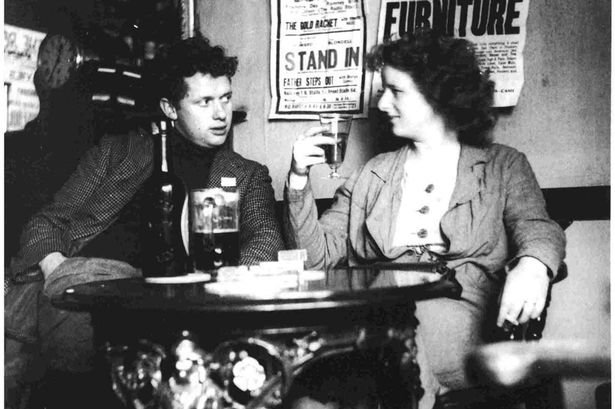
Dylan and Caitlin Image
Dylan liked to boast they hit it off immediately and that he drunkenly laid his head in her lap and proposed. They had a bond that would last through Dylan’s whole life. Obviously, this connection didn’t stop him from being unfaithful to her several times, which prompted vicious fights between the two. But she never left him.
For example, during his first literary tour of America, he was unfaithful to Caitlin, who had stayed at home. And so, she came with him on the second one, to make sure nothing like that happened. it’s a bit of a strange reaction, in my opinion, at least.
The Thomases had three children, which they often placed with the grandparents, while they were away in London (very frequently). They also drank heavily together.
Dylan Thomas was a pacifist and was deeply against the Second World War. He was afraid he would be drafted, so he called on his lung-problems as an excuse. He was eventually enlisted, but classified as a Grade III (which meant he would be among the last to be called up – which he never was). Ironically, he did participate in the war effort (despite his misgivings and general antipathy for WWII) by writing plays for the BBC, which were essentially war-propaganda.
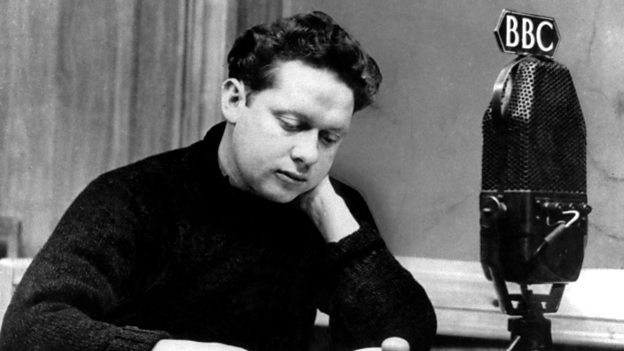
Despite his frequent collaborations with the BBC, Dylan lived with his family in very meager conditions. It can be said, I suppose, that this only worsened his drinking, but the truth is, he always had a proclivity for that.
In the last few years of his life, he suffered several blows – his father’s death in 1952 affected Thomas greatly (he wrote Do Not Go Gentle Into that Good Night, one of his most famous poems, for his dying father), as did the loss of his sister to cancer and the early deaths of several friends.
Thomas was always a great entertainer, he enjoyed receiving attention and shocking people. He drank heavily throughout his American tours, even showing up drunk at several readings. He enjoyed it, for some reason. And I suppose, in the end, a (short) life of excess caught up with him.
He arrived in America on the 20th of October, 1953, looking pale and shaking, worrying his friends and mistress, Liz Reitell. In his last days, the poet suffered numerous blackouts and had trouble concentrating. He also complained of not being able to breathe and very probably suffered from gout.
He was treated with several injections, which didn’t really cure anything and may very probably have worsened his state. During that time, there was a serious smog problem in New York (where he was staying at the time), killing over 200 people, and it obviously didn’t help Thomas, who already had respiratory problems.
Even less helpful was his heavy alcohol consumption. He’s said to have boasted, on the night of November 2nd, that he’d had no less than “18 straight whiskies”, which he proclaimed a record. The barman who’d server him later insisted it was impossible he’d drank more than half that amount. Still, nine of ten whiskies isn’t something to sneeze at, is it?
He felt ill throughout the next day and his physician very stupidly administered morphine shots, which only made it even more difficult for Dylan to breathe.
He was taken to the hospital that night, having turned blue and slipped into a coma, from which he never recovered. It was later confirmed that aside from bronchitis (which had followed him throughout his life), the poet was also suffering from pneumonia at the time of his death.
He died on November 9th 1953, at the horribly young age of thirty-nine.
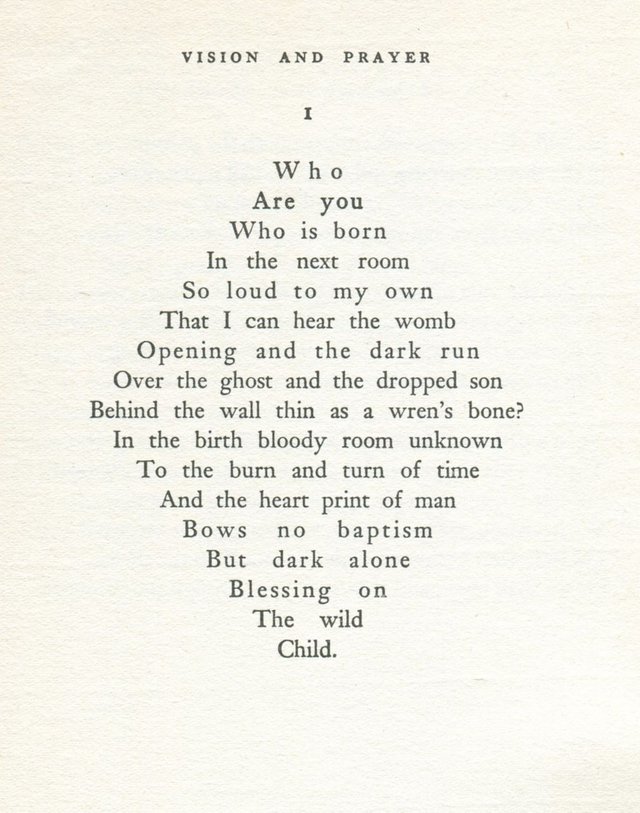
Dylan Thomas - Vision and Prayer Image
As I’ve said before, people love a good tormented-artist story and are quick to blame Dylan’s untimely death on alcohol abuse, but that is very probably not the case. He showed no signs of the cirrhosis associated with heavy alcohol consumption. It is likely his respiratory problems killed him. An x-ray found that both his lungs were largely affected and he had a lot of trouble breathing.
Dylan Thomas was a phenomenally talented writer, with a unique vision, whose writing went on to influence many generations of writers. Dubbed the “greatest living poet of the English language” during his lifetime (a very well-deserved title), his literary achievements and talent are often overshadowed by his exuberant persona and this popular myth that he drank himself to death. In truth, he was just another artist with a troubled life, but with fabulous talent.
His incredible "play for voices" Under Milk Wood was later adapted into a film, starring Richard Burton and Liz Taylor. And yes, he's the guy Bob Dylan took his name from.
And thus concludes our series on tormented artists and their lives. I do hope you’ve enjoyed reading as much as I’ve enjoyed writing.
As always, I encourage you to share with us your own favorite “tormented artists” who were not mentioned here, as well as your thoughts on the stories we’ve presented.
Authored by @honeydue
Click on the coin to join our Discord Chat

Witness proposal is here:
Go To Steem Witness Page
In the bottom of the page type: adsactly-witness and press vote.

Use small letters and no "@" sign. Or, click here to vote directly!
Thank you!
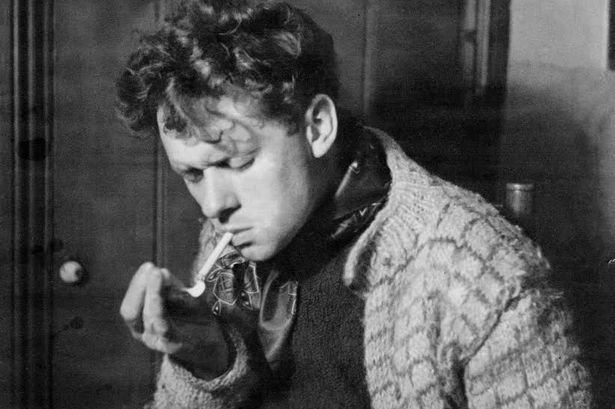
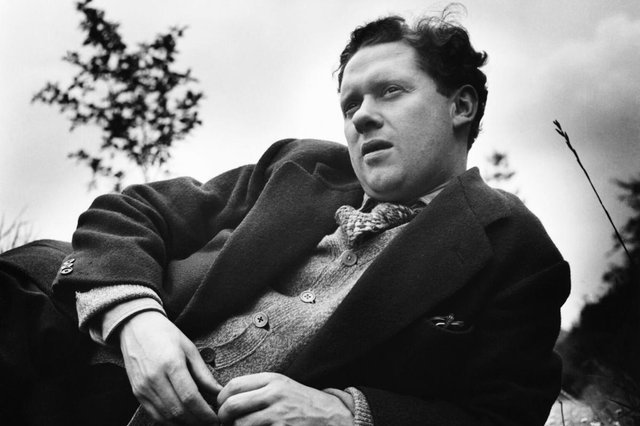
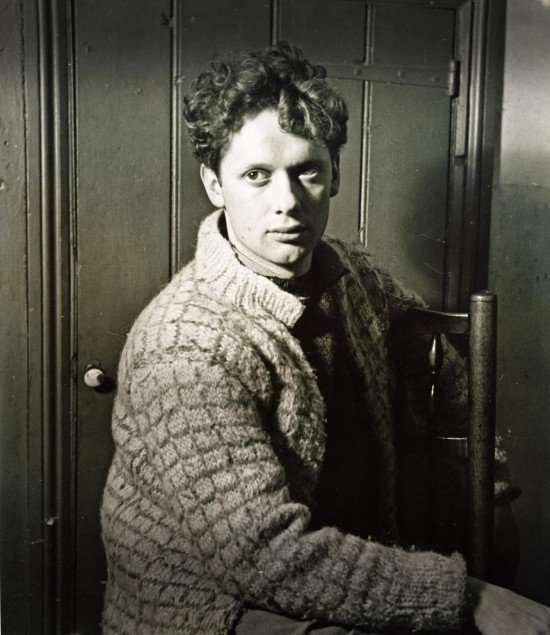
273/5000
I did not know this writer Dylan Thomas nor his tormented life. Like many valuable characters in his poetic work, he lived for what I read a life marked by the consumption of liquor. Surely product of their economic fustrations. Thanks for sharing your excellent post.
An intense, countercurrent life. Also a brilliant life, and died out like a shooting star. The work he left behind is invaluable. The poem you refer to "Do Not Go Gentle Into that Good Night" is a moving work.
I didn't know many aspects of his life, although I have read many of his works, and I must tell you that, in this sense, your post was very informative to me.
In my experience, Dylan is a recreator of sensitivities and a voice of a resonant, almost mythical lyricism. It is a voice that is planted from poetry to importune the shadows. The selection of photos you took is beautiful.
Thank you very much, @honeydue, for this post and thank you very much, @adsactly, for publishing it.
It is very gratifying that you brought your series to finish with Dylan Thomas, a poet for whom I feel a great appreciation. Your post is a beautiful tribute, because it feels like you love his poetry. Dylan Thomas is among the poets that when we were young we read among friends; we were attracted by his vital force and his word so emotional and profound. Now I remember, in particular, a poem about the craft of writing entitled "In my craft or devilish art", which is permeated with rebelliousness, love and irony, and one that was engraved on me forever: "And death shall have no power". This seems to be the case in cases like yours, since, despite death, it continues to animate our feelings. And finally, there is a text that I had the grace of getting into my hands quite some time ago, which was entitled "Notes on the Art of Poetry". It is a testimonial essay, of a peculiar beauty and of great affective disposition, perfect to initiate someone in poetry; I used it on several occasions when I was giving poetry workshops and even in my classes at the university. Just one detail; he begins by saying: "I confess to you that at first I wanted to write poetry because I had fallen in love with words". Thank you for these interesting texts that you offered us in this series. I will continue reading to you. Greetings.
I like Dylan Thomas' poetry very much. Like the other characters you approached, this one also had a strange childhood. His father put in him the dreams that he could not fulfill, his mother was a superprotective, and although Dylan believed he was made to do great things, success and fame became elusive. Not to mention that the excessive consumption of alcohol from a very early age and his amorous disappointments made him a man who lived on the edge. Once I read that some had thought that Dylan had committed suicide, others that it was alcohol, although there is no proof of either version. Thank you for this interesting series, @honeydue.
As usual you bring us an interesting post.
in this series you tell artist with the pain life. in my opinion, they make their life unhappy. but in other hand by this sorrow they create great work. This time you tell about Dylan Thomas. Some time I think the happy family will be product happy generation. Apparently not necessarily. Dylan whose childhood was full of love and happiness at the end of his life could also be said to be less than happy. But maybe that is a choice for everyone and Dylan wants to choose on his way.
Thank you @honeydue
Thank you @adsactly
Thank you Steemit
Warm regard from Indonesia
Yed
Posted using Partiko Android
Hi, @adsactly!
You just got a 0.36% upvote from SteemPlus!
To get higher upvotes, earn more SteemPlus Points (SPP). On your Steemit wallet, check your SPP balance and click on "How to earn SPP?" to find out all the ways to earn.
If you're not using SteemPlus yet, please check our last posts in here to see the many ways in which SteemPlus can improve your Steem experience on Steemit and Busy.